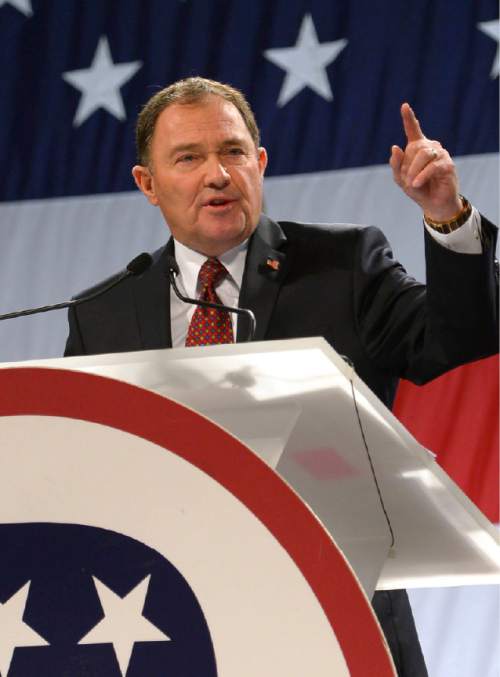This is an archived article that was published on sltrib.com in 2014, and information in the article may be outdated. It is provided only for personal research purposes and may not be reprinted.
Gov. Gary Herbert does not expect Utah lawmakers to try to undermine the new right of gays to marry in Utah, but he says that doesn't mean they will not try such things as ensuring that churches and clergy won't be forced to perform marriages.
"I look at it more as a positive reinforcement of religious freedom as opposed to undermining the rights of same-sex couples," he said Thursday.
That came during taping of his monthly news conference on KUED, where he also defended the Governor's Office of Economic Development against a recent, scathing audit, and also spoke about relocation of the state prison.
When Herbert was asked if legislators might push bills to undermine the recent Supreme Court ruling allowing gay marriage, he said, "I don't know that we want to undermine anything. I think there might be some concerns about making sure that we strengthen religious freedom."
Rep. Jacob Anderegg, R-Lehi, has said he plans to push a state constitutional amendment and statute to ensure that churches, clergy, elected officials and others who oppose gay marriage on religious grounds are not forced to perform them.
Sen. Jim Dabakis, D-Salt Lake City, who is gay and married, has said he does not foresee opposition to that. "I don't think anybody ought to be required to perform a marriage they don't want to perform…. And why would anybody want to be married by someone who is coerced into marrying them?"
But Dabakis has warned that he and others would fight expansion of such legislation to include allowing wedding photographers, wedding cake bakers, reception centers or other businesses to choose not to serve same-sex couples.
"I would have a problem if they start saying LGBT people are in a special class, and they can be discriminated against," Dabakis said earlier this month.
Herbert on Thursday discouraged approval of legislation pushed in recent years by Sen. Steve Urquhart, R-St. George, to ban housing and employment discrimination against the lesbian, gay, bixsexual and transgender community.
Herbert said he prefers that cities, not the Legislature, pass such laws locally — and said more than 20 of them have done that so far.
"I think that's an appropriate way for it to continue," Herbert said.
"I don't think that LGBT people should be discriminated against in housing and employment at all, so the question is what do we want to put on the books that is universal," Herbert said.
Herbert said other legislation about same-sex marriage is possible, largely because the Supreme Court did not consider and rule on a case — but decided to let lower court rulings stand. "There's no finality until it's final. And clearly the Supreme Court by not addressing it has left the door open."
After the news conference, Herbert also defended his Office of Economic Development against a recent state auditor's report that the office played fast and loose — and did not provide appropriate oversight — as it provided $600 million in economic incentives in the past eight years.
"It's a model for other states," Herbert contended. "We are the envy of the country."
He added, "We don't risk any tax dollars in our incentive programs unlike other states that actually give you money upfront to come. We don't do that."
Incentives are paid only after new companies show they have created new jobs, he noted. "You've got to perform."
Herbert also spoke to reports that potential sites for relocation of the Utah State Prison have been narrowed only to areas in Utah and Salt Lake counties — and addressed whether it makes sense to put a new prison relatively close to the current location.
"The motivation for this [relocation] is to have a better prison. The one we have there is just obsolete. You can remodel and rebuild on site, or you can build probably a more effective prison" in a new location.
He also said, without revealing what sites are under consideration, "I expect we will need to have a place that is conveniently located for the workers, for the volunteers, [and] that has minimal disruption to neighbors."



